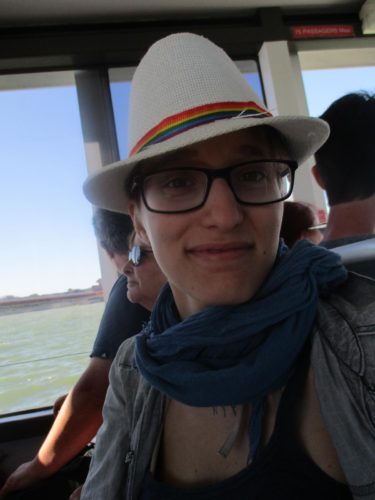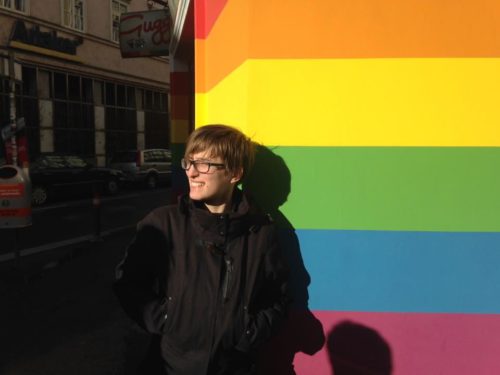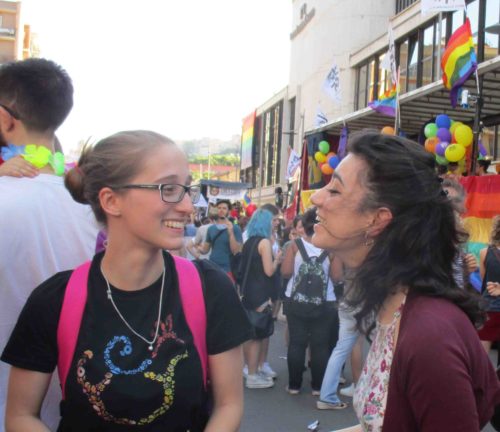In most of the previous interviews, we had the chance to read the experiences of lesbians* who live in major cities of the world. Many times they underlined that the living conditions of lesbians* and LGBTQ+ people differ a lot whether they live in metropolitan areas, like they do, or in more remote towns. We felt it was time to give voice to the latter too.
Today we are going to talk with someone who can share her first-hand experiences of what it means to live in a small town as a lesbian*. Let me introduce Ilaria, our first interviewee of 2019.
Ciao, Ilaria. Can you introduce yourself please?
I am Ilaria Todde, born and raised in a town called Nuoro, on the island of Sardinia, Italy. Right now I am living in Brussels, Belgium, where I have started a career in EU affairs. During my studies, I also lived in Trento, a small town in the far-north of Italy, which is where I began my lesbian activism in a local lesbian organisation. This grassroots experience then lead me to a diversified involvement in LGBT+ and especially lesbian* issues, at first on the national level, and now I am very happy to be among the organisers of the European Lesbian* Conference. We are currently working on the second edition of the conference, which is going to be held in Kyiv, Ukraine, between 12-14 April. Registrations are open!

Thanks for the reminder, we’ll be there in Ukraine. But now let us travel to Italy. Generally, what would you say about the situation of the LGBTQ+ community there?
In terms of legal rights, a law on civil partnerships was approved in 2016. The law is far from being perfect (especially on the recognition of same sex parenting) but it is undoubtedly an important step forward for the country, considering the complete lack of recognition that we had before.
Concerning the social situation, I believe it depends a lot on the place where a person lives. In reality, it is quite difficult to generalize; the experiences can vary a lot depending on a number of factors, for example, on the size, the religiousness, or the economic situation of the specific town. I often hear people say that generally Northern Italy is more accepting than the South, probably due to the fact that the former is richer and economically more developed. Nevertheless, my own experiences tell me the opposite. Trento, despite being a Northern, thus wealthier, town, has a stronger religious identity and a more conservative culture, than, say Nuoro in Sardinia (which is considered to be part of the South).

Can you say a bit more about these two cities?
Trento and Nuoro are two very different towns, historically, culturally and economically speaking. However, there are similarities regarding LGBTQ life. In both places, people tend to prefer not to come out in the workplace. This reluctance can be explained both by the perceived difficulties to be protected against discrimination, especially when having precarious jobs (which is quite a common situation), and the fact that the economic crisis has made it extremely difficult to find another job.
What about social life?
The two towns I have mentioned are both quite small and geographically remote. This has a huge impact on the availability of specific places for lesbians*. Trento is richer, bigger and there are certain LGBTQ associations. Last year, for the first time, a Pride was organised in the town, which is, of course, extremely important for LGBTQ+ social life. However, specifically lesbian* places do not exist, and even maintaining a lesbian organisation can be challenging, due to the resources available and the fact that it depends only on the work of volunteers. I believe, though, that in small and remote towns the presence of lesbian* organisations can really make a difference and can ensure that there is at least one safe place for lesbians*. In fact, the organisation of such events and the maintenance of such open space for lesbians* was my main focus as an activist in Trento.
On the other hand, in Nuoro, given the small dimension of the town and the total absence of an organised lesbian* and LGBTQ movement, it is quite difficult to even think about something you could call a “lesbian* social life.”

It seems you were pretty much on your own growing up as a lesbian*. How did it impact your coming out?
The timing for this question is actually perfect, as it is the 10th anniversary of my first coming out. Since then I have accumulated quite some experience. One of the things I learned quite quickly is that most of the time coming out gives an occasion to the people around you to show their best selves. Even when reactions are negative, coming out is one of the best tools to evaluate how strong a relationship is and on which grounds it is based. I have to say that most of my experiences have been rather positive; in fact, never have I received very negative reactions from the people I really cared about. Even the "difficult" coming outs (to my parents, for example) ended up being stories with happy endings.

